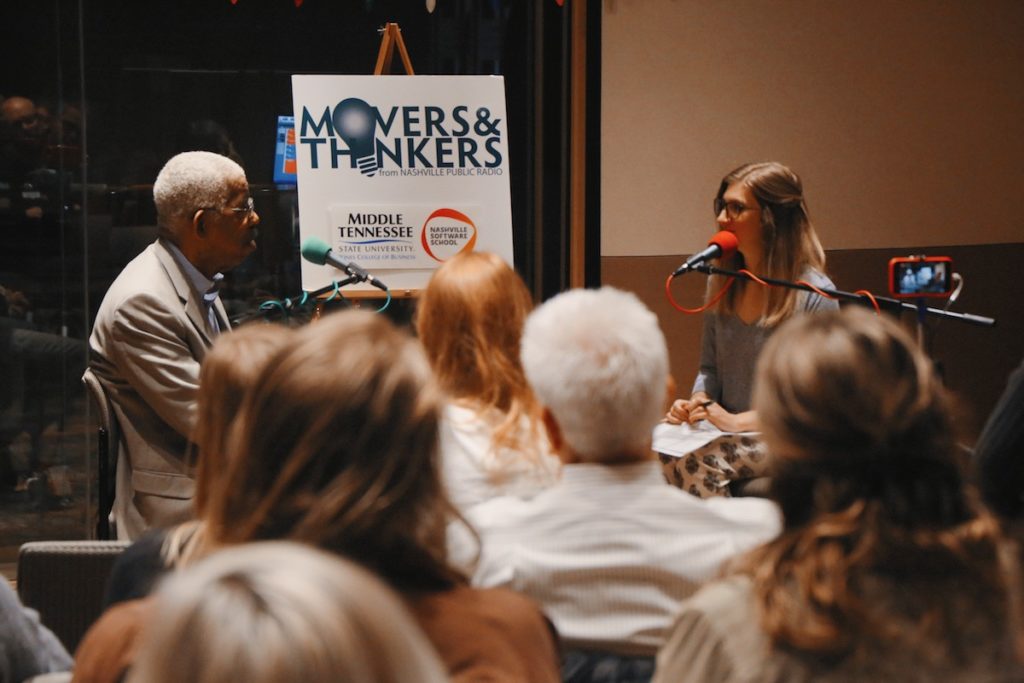
Lifelong Nashville resident and activist Ernest Rip Patton died Tuesday.
The Freedom Rides Museum announced his death on Facebook, and a family friend confirmed it separately to WPLN News.
Patton was best known for his role in the Freedom Rides, a movement of students — many of whom attended Black universities in Nashville — who risked their lives to desegregate interstate buses in the South.
After Patton and others were arrested and sent to Mississippi’s notorious Parchman penitentiary for several weeks, his university expelled him. He and 13 other former students received honorary doctorate degrees in 2008 — 47 years later.
Despite the upheaval of the experience, it was one that he took pride in sharing, especially to young people. He was a frequent public speaker and interview guest (including WPLN News podcasts Movers & Thinkers and Versify, and on the Oprah Winfrey Show). He was known for bursting into song during interviews to explain how they’d sing in Parchman.
“The guards didn’t like that,” he told WPLN’s Versify last year. “The only thing they could do was to take something away from us. For example, a mattress. This mattress was probably an inch thick on a steel-bottom bed. ‘If you don’t stop singing, we’re going to take your mattress away.’ ‘OK, open the door.’ They’d open the door, we’d throw our mattresses out in the hallway.” Then he sang an adaptation of a spiritual: “You can take our mattress, oh yes. You can take our mattress, oh yes. You can take our mattress, you can take our mattress, you can take our mattress, oh yes.”
In an interview with WPLN’s Movers & Thinkers, he recounted how one of his fellow Freedom Riders asked the guards, “What are you going to do? Throw us in jail?”
Patton’s passion for music and activism started early. Born on March 10, 1940, he entered Tennessee State University — then Tennessee A&I — as a music major and joined the Aristocrat of Bands. He also joined student protests against entrenched racist policies in Nashville. He participated in the now-famous sit-ins that successfully desegregated Nashville’s lunch counters in 1960, as well as stand-ins to desegregate movie theaters.
His role in nonviolent protests intensified when the Freedom Rides launched in May 1961. He volunteered to join and ended up in a group of students who drove down to Montgomery, Ala., to board a Greyhound bus. The work as a foot soldier in the Civil Rights Movement would be dangerous, they knew: The goal was to induce fierce political opposition — and ultimately violence — that would force white America to confront and revise its central edicts.
Before the trip, “we had all made out our last wills and testaments,” he told Movers & Thinkers. “We were a very tight group here in Nashville, very tight. We were like a military group. We had each other’s back. If you can do it, I can do it.”
His mother didn’t find out about his role in the Freedom Rides until a friend told her that she saw him on TV, being arrested in Jackson, Miss., which resulted in several weeks of imprisonment.
Later on, he would make no effort to hide his participation. The Freedom Rides Museum noted that “he was one of the Riders who most frequented the museum. He spoke to countless groups of visitors in the museum over the last ten years.”
But the memories were not always easy to handle. In his conversation with Versify, he said a group of former Freedom Riders had gathered in Nashville many years ago and realized that different participants had repressed different moments of their experience.
“We were questioning each other, or we would talk about things, and then somebody would talk about things that they had forgotten. And so that’s how we would pick up little bits and pieces,” he said. “But then we decided not to really lie down on somebody’s couch and be put under and go through what happened. We decided not to do that, because it might stir up something else.”
He last visited the museum in May of this year, for the 60th anniversary of the movement.
This story has been updated to add confirmation of Patton’s death.

